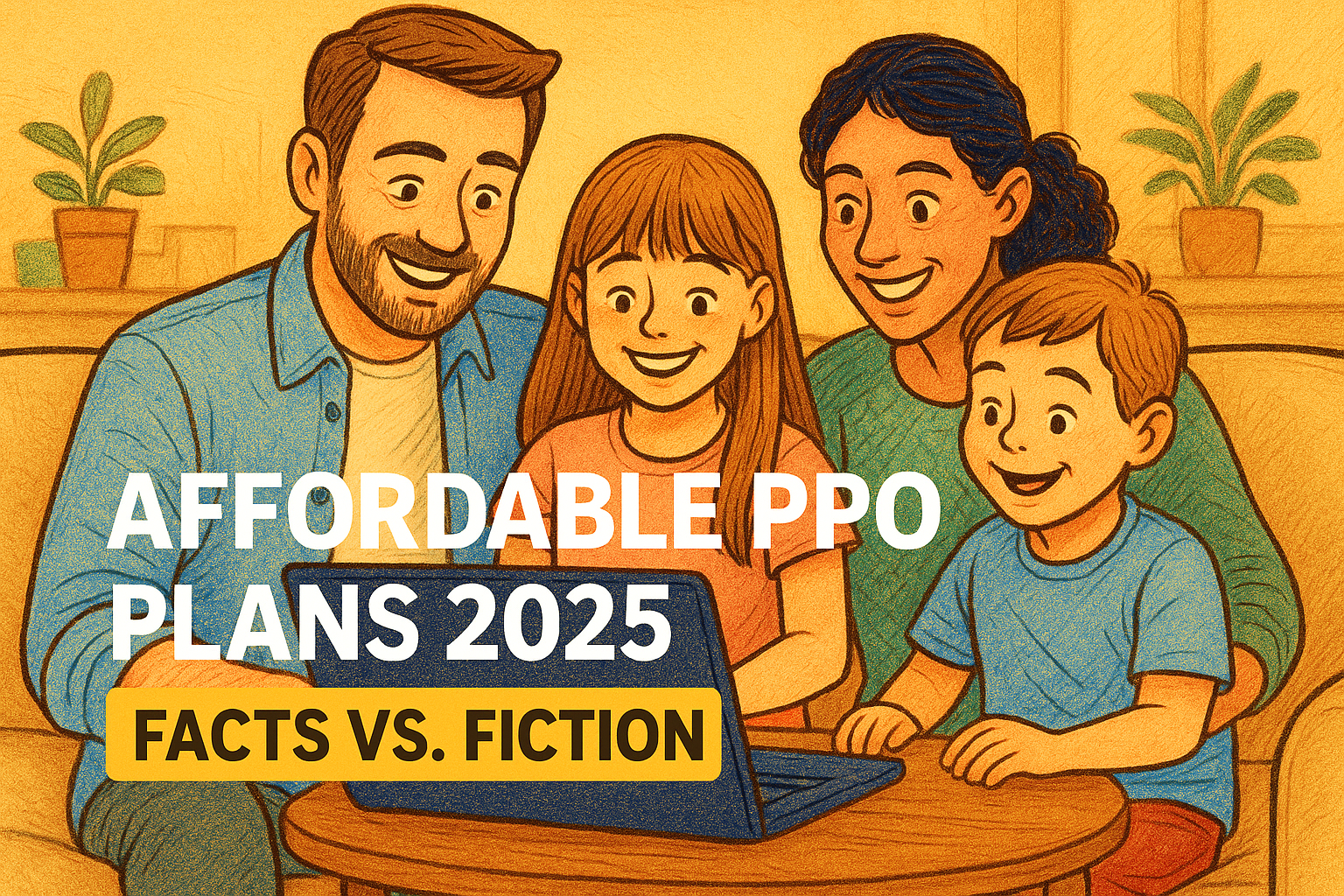
Affordable PPO Plans in 2025: Myths vs. Reality
In 2025, more people are turning to PPO insurance plans for flexible care and broader provider access. Despite common myths, many of today’s PPOs offer real value—often at lower costs than you’d expect.
If you're exploring good health insurance plans in 2025, it’s worth taking a fresh look at modern PPOs and separating fact from fiction.
What Is a PPO Insurance Plan?
A PPO (Preferred Provider Organization) is a type of health insurance plan that gives you more flexibility and freedom in how you get care. Unlike HMOs, PPOs allow you to:
See any doctor or specialist without a referral and nationwide
Use out-of-network providers (though at a higher cost)
Access a broad network of hospitals and clinics
That flexibility makes PPOs a great option for people who want more control over their healthcare. Whether you travel often, need frequent specialist care, or have preferred doctors, a PPO can work well.
More than 60% of Americans say being able to choose their own doctors is the most important part of a health insurance plan.— KFF Health Survey, 2025 1
Myth #1: PPO Plans Are Always Too Expensive
It’s true that PPOs used to be significantly more expensive than HMOs. But that’s not the full story anymore.
In 2025, many PPO insurance plans are competitively priced—especially when offered through an employer, with tax credits from the marketplace, or private options through brokers. While monthly premiums may still be slightly higher, the added value—like quicker access to care, broader networks, and fewer restrictions—often outweighs the cost.
So, the idea that all PPOs are too expensive? That’s outdated.
Myth #2: Only Wealthy Families Can Afford PPOs
Another common myth is that PPOs are only for the wealthy. This simply isn’t true anymore.
If you're buying insurance through your employer, there's a good chance a PPO option is available at a discounted group rate. If you're shopping on the marketplace (like HealthCare.gov), you might qualify for subsidies based on your income—making even premium PPOs affordable. There are also private options that you can purchase through brokers or directly from the insurance companies.
Many middle- and lower-income families are now enrolling in PPOs because they want more choice, more doctors, and quicker access to care—not because they’re wealthy.
Myth #3: HMO Plans Are Always the Better Option
HMOs can work well for those who don’t mind staying within a limited provider network. But they aren’t the best fit for everyone.
PPOs typically offer:
No referrals needed to see specialists
Larger provider networks
Better access to out-of-network care
For families with kids, people managing chronic conditions, or anyone who values freedom in their healthcare decisions, PPOs often provide better long-term value—even with slightly higher premiums.
How to Find Good Health Insurance Plans with PPO Options
With so many plans available today, finding a PPO that fits your needs (and your budget) doesn’t have to feel overwhelming. Whether you're browsing on your own or working with a licensed expert, here are some key steps to guide your search.
Use trusted websites like HealthCare.gov, private insurers, or a licensed insurance broker.
Compare key features: monthly premiums, deductible, provider network, and whether your current doctors are included.
Look for plans labeled as PPO and verify they fit your care preferences.
Taking the time to compare your options can help you avoid costly mistakes—and make sure your plan actually works for your real-life needs. A little upfront research can go a long way in getting the right coverage and peace of mind.
Smart Ways to Save on PPO Insurance Plans
Worried about PPO costs? The good news is, there are several simple ways to keep your monthly premiums and out-of-pocket expenses manageable—without giving up the flexibility you want.
Choose a higher deductible if you’re generally healthy—it can lower your monthly cost.
Always use in-network providers to avoid surprise bills.
Take advantage of free preventive care services (like checkups and vaccines) covered under most plans.
By being strategic with your plan choices and how you use your benefits, you can unlock all the perks of a PPO—without breaking the bank. It’s all about using your coverage smartly.
Common Questions About PPO Insurance Plans
What makes a PPO different from an HMO?
A PPO allows you to see any provider you want—no referral needed—and offers broader coverage for out-of-network care. HMOs are more restrictive and usually require referrals to see specialists.
Will I be able to keep my doctor on a PPO plan?
Most likely. PPOs typically have larger provider networks than HMOs. Always check if your doctor is listed as “in-network” for that plan to get the best pricing.
Do PPO plans cover emergency room visits?
Yes. Emergency care is covered—even if you go to an out-of-network hospital. Just know you may pay more if the provider is outside the plan’s preferred network.
Are PPOs a good option for families?
Definitely. PPOs offer flexibility for families with different medical needs, and make it easier to see pediatricians, specialists, or get second opinions without delay.
Final Thoughts: PPOs Are More Affordable Than You Think
In 2025, PPO insurance plans are no longer reserved for the wealthy or those with major medical needs. They’ve become a smart, realistic option for individuals and families who value choice, flexibility, and peace of mind.
The convenience, control, and provider access PPOs offer often make them worth the investment over an HMO. Thanks to expanded subsidies, employer options, and more competition in the market, finding an affordable PPO plan that works for you is more possible than ever. Contact us to get a free quote today!
